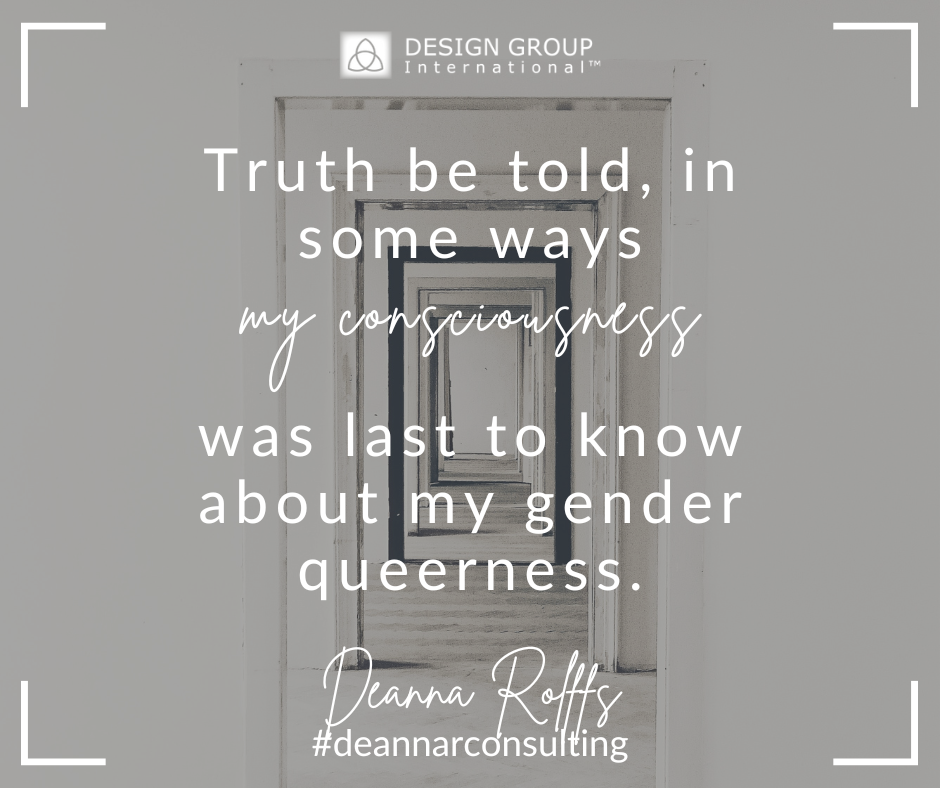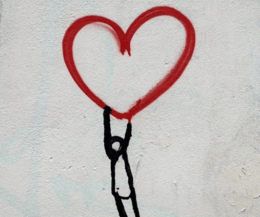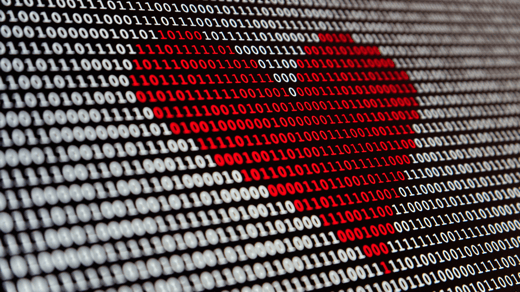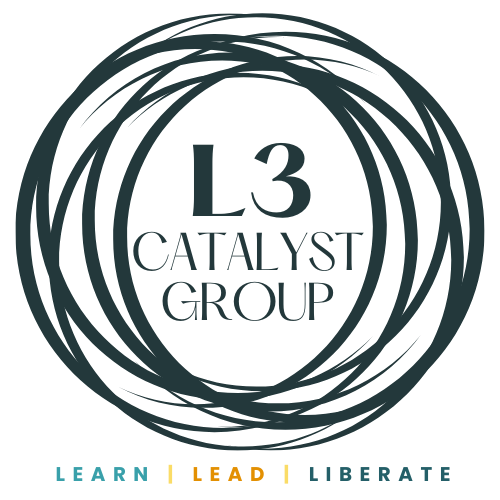Recently, I came out as genderqueer.
I've known since I was five that I didn't fit the gender binary, but I didn't have words to describe it. Instead, I thought and felt that there was something deeply wrong with me.
In the last few years, the truth of my gender identity sunk so deeply into my bones: I don't fit a gender binary.
I had many reasons not to tell anybody what I've learned about myself in the last few years.
-
-
- People may think I'm attention-seeking, co-opting a marginalized identity for my own gain.
- They'll use it as a weapon to validate to themselves that being queer is a choice, the popular thing to do.
- People have shown me that they're not queer-inclusive; why put myself in that hated position?
- People will try to force me to choose between queer inclusion and anti-racist commitments because humans struggle with intersectionality.
- How do I start to identify as genderqueer at my age? What does this mean in my relationship with the queer community?
-
I don't claim to know what it's like for others, but for me, being genderqueer means that when the gender construct of femininity does not bind me, I feel free. I am myself.
I am joy. 
Truth be told, in some ways,
my consciousness was last to know.
Months ago, I was thinking out loud with a special teenager in my life, sharing some of these reasons to keep my gender identity quiet. They looked me in the eye and kindly said, "Mom, that's not how identity works." It was the gift of truth.
I knew that not coming out would mean denying who I am – who I've always been.
I'm genderqueer and nonbinary. For me, it's expressed in a million ways that have always been true. While pronouns do not equal gender identity, using they/them/their pronouns in addition to she/her/hers is freeing and expansive.
I offer a few critical, grounding definitions:
Gender binary: "The idea that there are only two genders is sometimes called a "gender binary," because binary means "having two parts" (male and female)." (Source: National Center for Transgender Equality)
Non-binary "is one term people use to describe genders that don't fall into one of these two categories, male or female. "(Source: National Center for Transgender Equality)
Gender is a social construct. "Gender refers to the characteristics of women, men, girls, and boys that are socially constructed. This includes norms, behaviours, and roles associated with being a woman, man, girl, or boy, as well as relationships with each other. As a social construct, gender varies from society to society and can change over time" (Source: WHO)
"Sexual orientation refers to a person’s “emotional, affectional and sexual attraction to…individuals of a different gender or the same gender or more than one gender.” Heterosexuality, homosexuality and bisexuality are all sexual orientations. The terms lesbian, gay and bisexual also refer to an individual’s sexual orientation." (Source: International Justice Resource Center)
"Gender identity refers to “each person’s deeply felt internal and individual experience of gender, which may or may not correspond with the sex assigned at birth.” Many individuals identify as male or as female. However, some individuals may identify with a non-binary gender or with no gender at all. A person’s gender identity may be different than the gender that society might attribute to that person on the basis of external signifiers such as clothing or mannerisms." (Source: International Justice Resource Center)
 Many people cling so tightly, so fiercely, to the gender binary; it's as if their life depends on it.
Many people cling so tightly, so fiercely, to the gender binary; it's as if their life depends on it.
I've learned a few things in these past few months:
-
-
- I greatly underestimated how many people are unfamiliar with being genderqueer.
- I have dissonance that this is a big deal, yet it's not a big deal at all because it's always been true. I have new words for it now.
- Many people don't know that gender identity and sexual orientation are different. If that's news to you, please spend some time on this. For me, this is about my gender identity, not my sexual orientation.
- I'm not interested in spending effort proving the validity of my identity to anyone.
- Many people aren't sure how to ask me about my pronouns, which are they and she. It's easier to explain it here, to be open and honest without shame than it is for me to wonder how to handle it when I notice people's confusion.
- I'm not seeking validation or affirmation.
- Terms matter, so I keep learning. I despise the term affirmation to name LTGBTQIA+ inclusion. I also hate the term phobia dealing with queerness; lack of inclusion is much more violent than phobia – a fear.
-

Why come out now? Because it was the right time for me. Previously, I was in employment situations that would not have been welcoming. I could not have come out at the faith-based organization I worked at previously. I own my own business and am a Partner in a consulting community of practice, which provides security and less dependence upon one employer. Will my gender identity negatively impact my consulting practice? Maybe. Time will tell.
Why write about this in a blog on leadership and learning? Writing this is very risky and exposing. Yet it's simply true. Why hide? I learn and find community when I write about what is messy and unclear. I surround myself with people brave enough to learn and be vulnerable. In this blog I encourage you to increase consciousness of your power and privilege to fight injustice, so I'd be hypocritical if I couldn't do that as well. Our learning and growth aren't static, so why act like we have it all figured out?
I write this now because this isn't only about me. My queerness comes with layers of privilege. With that comes responsibility which I'm still learning about. Authenticity is a core personal value, yet not all have the same privilege to come out and be fully accepted. The presence of queerness all around us, in our faith communities, workplaces, neighborhoods, family gatherings, and homes. If you don't see queer people around you, it's most likely that the spaces aren't welcoming and queer-inclusive. Period.
 I hold much gratitude and privilege in coming out and experiencing the full embrace of a community of friends, neighbors, family, clients, and faith community.
I hold much gratitude and privilege in coming out and experiencing the full embrace of a community of friends, neighbors, family, clients, and faith community.
Being genderqueer is joyful, expansive, and liberating. It's also a personal and professional risk. Queer ancestors have fought and died (and are still suffering and dying) for our ability to be. We can all be a part of changing this.
Being non-binary is not new. This may be new to you. Gendered binaries are the norm. When we identify within that binary, our identity is normalized and deemed to be right and true. If this fits you, I encourage you to be curious to listen and learn. Dissonance is healthy.
If this concept of the non-gender binary is new to you, I encourage you to intentionally learn. Interrogate what you've been taught. Consider who and what the gender binary and heteronormativity protect.
Friends have encouraged me not to jump all over myself to explain or justify my existence. If you are curious, please ask! Alternatively please honor it if I'm not in the place to discuss it with you at that time. I promise I'll be honest. I ask you to be open.
Thanks for holding space with me, friends.
Fellow leaders and learners, I wish you courage and resilience for the journey.


A Few Places to Start:
-
-
- Understanding Non-Binary People: How to Be Respectful and Supportive by the National Center for Transgender Equality
- Pronouns Matter by pronouns.org
- Nonbinary, But Not Transgender? A brief look at these identities and how we apply them by aninjusticemag.com
- What Is a Social Construct? via verwellmind.com
-

Questions for Consideration Regarding This Topic:
-
-
- What do you notice about your reaction to the definitions of non-binary, gender binary, or social construct? Are they familiar, new, or somewhere in between? How do you see these in your life, community, circles, and faith community?
- All people use pronouns. Misunderstanding and overt violence are evident toward nonbinary or trans folks (even to death). How can you engage in the next step of learning?
- How do you react to the truth that gender identity and sexual orientation are different, while both are marginalized and sometimes evident in the same people? What wonderings do you have about this? How do you see this? Who is a trustworthy and inclusive source to go to for more information? Tip: if you don’t identify as 2SLGBTQIA+, learn from those with that identity.
- How are pronouns different from gender identity? From gender expression?
-

Recent and Upcoming Leadership & Learning Letter Topics:

October 26, 2022




Comments